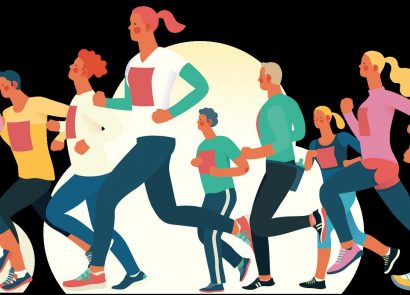“The sea was always my escape when I was younger. My mum had cancer so I grew up as a carer. Having that routine of going to the sea regularly really made a difference but you forget those things as you get older, don’t you? You just get carried along by life…”
Meet Imogen Tinkler, a forager and supperclub host from Whitstable (bangersandballs.co) whose need for psychological grit came speeding back when her second daughter, eight-weekold Beatrix, died suddenly from a seizure. “When something like that happens you really have to dig deep and put that survival routine in,” Imogen explains. “You have to keep going. I thought ‘OK how are we going to get through this as a family? What do I have to put in place?”
Like many people in times of crisis, Imogen built a new routine to pull her through the hours. One element was a daily dip in the frigid waters off Kent’s stoney beaches, where she set up a local branch of The Bluetits, a free wild swimming collective. “Maybe it was a form of muscle memory; when my mum was low she would go to the sea, though as a child I didn’t realise she was teaching me a coping mechanism. Once the group was set up I had a new routine in place to go swimming every day.”
Habits to help you cope
Imogen’s instinct for self-care may have come to her in dire circumstances, but more of us than ever are seeing the need to invest in our mental resilience. According to data from corporate wellbeing platform Gympass, which hooks employees up with wellbeing services, more people than ever are using mental fitness apps such as Calm and Synctuition, or booking one-toone counselling sessions. In fact Gympass has seen the balance of members’ check-ins shift away from physical fitness, with 65 percent looking for holistic wellbeing services.
And well they might. Research suggests working mentally-strengthening exercises into daily routines can build our reserves of emotional resilience to whatever our days bring. So just as physical exercise prepares us for an unscheduled dash for a train, or unexpected flight of stairs, mental exercises can build our capacity to handle adversity, or stress. In turn, growing a resilience to stressors can benefit our health and even our immune status.
So what works?
“We only have a finite amount of coping capability across the day that can become easily depleted if self-care isn’t a priority,” says Dr Myra Altman, a clinical psychologist at Modern Health, a global platform supporting mental health in the workplace (modernhealth.com). “This may look like irritability, low energy levels, changes in appetite, or inability to focus. By engaging in activities that are restful and rejuvenating, you are filling up your ‘coping container’ so that you will be more likely to be able to handle what comes your way.”
Myra’s platform is working with tennis superstar Naomi Osaka, who has been open about her struggle for mental fitness, and the impact psychological ordeals like press conferences – an inescapable part of her job – have on her state of mind. Alongside a new a meditation she’s released, Naomi explains how mindfulness “helps me feel prepared to address challenges”.
The mechanics are simple. “A lot of distress comes from worrying about the past or the future,” says Myra, “so exercises that keep us grounded in what’s happening right now can be incredibly helpful. When times are particularly stressful, this present focus allows us to practice what’s called ‘radical acceptance’: acknowledging that whatever is happening in this moment is happening and not trying to fight it. This then enables us to move forward with intention and think about the future in a more value-driven way.”
Creating those healthy habits
Other small but regular acts of self-care – yoga, journalling, prayer, breathwork or physical exercise – are also great for your mental fitness, the benefits accumulating to keep your emotional outlook stable and optimistic. The crucial thing is to start small and let them aggregate: what chartered psychologist Kate Oliver (KOconsulting.co) calls ‘compound interest’. “Consistency is really important,” says Kate. “It’s actually the small changes – the things we do consistently – that have a truly transformational impact.”
Kate’s co-authored a new book, Rise and Shine: How to Transform Your Life, Morning by Morning (Piatkus, £9.99), which is about identifying small swaps to our morning routines that can completely change our emotional resilience to what unfolds. “It’s about the small things that set you up for success, and stopping the unhealthy things we do, like continually hitting snooze on the alarm, scrolling through our phones, or checking in on the news first thing. These things can instantly set us into a spiral of doom, or worry, or self-comparison.”
Instead, Kate recommends we refocus those precious morning minutes on armouring ourselves for the day ahead. “Research shows how you start your day matters; the mood and mindset you begin with tends to amplify throughout the day, and influences how you perceive things.”
Kate’s ‘SHINE’ approach encourages us to try various morning practices, each supporting one of the central tenets of a more positive approach. Moments of silence (perhaps involving meditation, breathwork or candle gazing) are followed by some happiness (positive affirmations maybe, or gratitude practice) and intention (including goal-setting and creative visualisations). Next up comes nourishment (a healthy breakfast, of course, but maybe also a few minutes of sunlight, mantra or time in nature) and finally exercise (some yoga, dancing or other forms of movement).
It might feel radical to swap your habitual morning phone check for a few moments every morning staring into space, or setting an intention for the day. But just try it; the transformation could be just what you’ve been longing for.
Find out more
Want to start building some more mentally-strengthening ‘workouts’ into your routine? Try the following…
Download: Calm is one of the most popular apps to help alleviate stress, with a wide choice of beginnerfriendly meditations, soundscapes and mindfulness practices to help improve sleep and curb anxiety
Listen to: Synctuition is another highly rated mindfulness and relaxation app featuring tools to help you de-stress, encourage a more positive mindset and boost sleep quality.
Investigate: If you’re employed, it’s worth finding out what support is available through work. For example, platforms like Modernhealth.com and Gympass.com offer a range of wellness services via employer schemes.
Read: Rise and Shine – How to Transform Your Life, Morning by Morning (£9.99, Piatkus) by Kate and Toby Oliver covers a whole host of ideas and daily tweaks you can make to help cultivate a healthy head space.



















